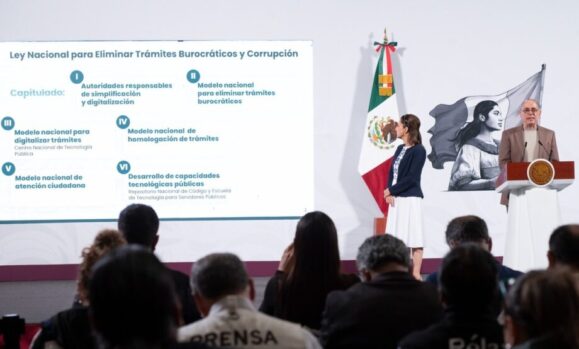On July 16, 2025, Mexico published the National Law for the Elimination of Bureaucratic Procedures, a landmark reform aimed at modernizing the public sector by digitizing, simplifying, and centralizing administrative procedures across federal, state, and municipal levels. This initiative is designed to eliminate unnecessary bureaucratic hurdles, combat corruption, and facilitate faster and more transparent access to government services for individuals and businesses.
Main Objective
The law establishes a comprehensive framework to standardize and reduce regulatory burdens while promoting digital transformation. It mandates digitalization of nearly all administrative processes, except certain fiscal matters and those under the jurisdiction of SEDENA and SEMAR.
Key Features and Benefits
-
Simplification and Digitization: Administrative requirements are reduced, response times shortened, and procedures digitalized after simplification.
-
Single National Digital Portal: The Digital Transformation and Telecommunications Agency will develop a centralized, national platform to access and manage all public procedures, fostering transparency and easier compliance.
-
No Redundant Documentation: Government entities cannot require documents already available in official databases. Digital documents carry equal legal weight as their physical counterparts, cutting repetitive paperwork.
-
National Digital Citizen Model: Every individual and business will have a unique digital file linked to the LlaveMX platform, allowing universal access to digital services and encouraging technology sharing across institutions.
-
Free and Assisted Access for Vulnerable Groups: Services are free and technically supported for vulnerable populations to guarantee inclusiveness.
-
Oversight and Enforcement: The law establishes a National Registry of Visits to monitor inspections and a certification system rewarding compliance. Authorities have powers to sanction public officials who fail to comply.
-
Data Protection and Transparency: Emphasizes cybersecurity measures to protect personal data and ensures equivalence between digital and physical formats.
Timeline and Implementation
-
Effective from July 17, 2025.
-
Repeals the previous General Law on Regulatory Improvement (2018) and dissolves its commission.
-
Deadlines include: 30 days for issuing guidelines and appointing state liaisons; 90 days for implementing the citizen service system; 180 days for repealing conflicting local regulations.
Why This Reform Matters for Businesses
This legislative change is more than an administrative update — it is a strategic shift with tangible business implications:
-
Reduced Time and Costs: By eliminating redundant steps and recognizing the legal validity of digital documents, it speeds up processes such as company registration, licensing, and permits.
-
Centralized Access: A single national portal consolidates procedures, cutting down the complexity of dealing with multiple agencies and jurisdictions.
-
Transparency and Corruption Prevention: Measures like forbidding unnecessary document requests and creating inspection registries reduce risks that traditionally slow down operations or add hidden costs.
-
Easier Regulatory Compliance: Harmonization of procedures makes it simpler for companies — especially those with multiple business units — to manage compliance in a uniform way.
-
Inclusive and Stable Environment: By ensuring free and assisted services for vulnerable groups, the law promotes social stability, which benefits the overall business climate.
-
Implementation Challenges: Businesses should anticipate a transition period with possible delays in less-equipped regions, as well as the need to ensure robust data protection when using digital government tools.
Practical Implications and Considerations
While the law paves the way for significantly faster business setup and operation by centralizing processes, simplifying paperwork, and assigning legal value to digital documentation, practical implementation challenges remain:
-
Infrastructure and Coordination: Some municipalities may lack sufficient digital infrastructure, creating potential delays in full adoption.
-
Regulatory Consistency: Early implementation may see mismatched local practices before full harmonization is achieved.
-
Training Needs: Extensive capacity building for public servants will be critical to delivering the intended benefits.
-
Data Security: Safeguarding sensitive information in the new digital files requires strong cybersecurity measures.
-
Digital Inclusion: Ensuring historically marginalized or underserved communities are part of this transition is key to its long-term success.
Why This Matters for Canadian Companies
Canadian businesses looking to enter or expand in Mexico can leverage the reform for competitive advantage:
-
Accelerated Market Entry and Expansion: Centralized, standardized digital procedures mean faster approvals and reduced uncertainty.
-
Minimized Paperwork: Legal recognition of digital documents means no repetitive submissions.
-
Streamlined Multijurisdictional Compliance: Harmonization reduces complexity for companies operating in multiple Mexican states.
-
International User Support: Dedicated technical assistance will make navigating local regulations more straightforward for foreign businesses.
-
Strategic Risk Management: Awareness of transitional gaps allows companies to prepare and mitigate potential disruptions.
Conclusion
The National Law for the Elimination of Bureaucratic Procedures is a milestone in Mexico’s regulatory evolution. It promises faster, more transparent, and digitally enabled interactions between businesses and government—benefits that Canadian companies can harness to strengthen their market position. Full realization of these advantages, however, will depend on effective implementation, robust digital infrastructure, and proactive adaptation strategies.
Our philosophy is at the heart of our name: Symbiosis represents close collaboration built on mutual benefit and long-term value. For Canadian corporations navigating these significant regulatory changes, we provide strategic legal counsel and compliance support tailored to their cross-border business needs. We help you understand Mexico’s new administrative reform, meet all legal and operational requirements, and reduce risks so your business can move forward securely and efficiently.
With our binational expertise, we connect you with trusted local partners, guide you through government procedures, and position your company to seize Mexico’s market potential with confidence.
Contact us to discover how we can help your business succeed in this evolving landscape.






